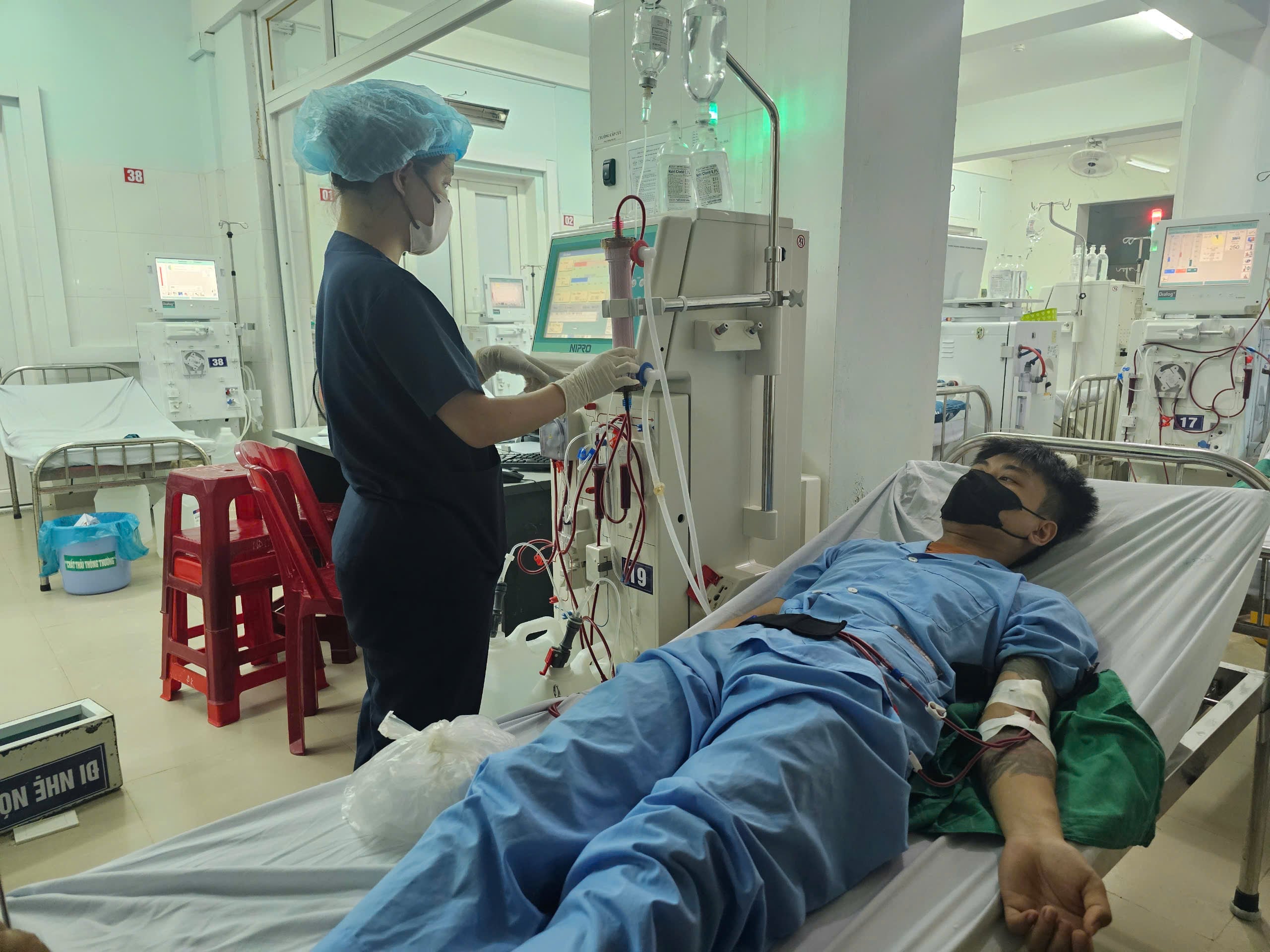Patients undergoing regular dialysis at the hospital - Photo: TN
At the age of 24, NHS, from Cam Lo district, felt completely devastated when doctors diagnosed him with acute pulmonary edema due to circulatory volume overload. Since the Lunar New Year, S. has noticed unusual signs in his body such as difficulty breathing, frequent high fever, and swelling in some parts of his body such as his feet and fingers. It was not until his health completely declined that S. worriedly went to Hoc Mon Regional General Hospital, Ho Chi Minh City for a check-up. The abdominal ultrasound results showed that S.'s two kidneys were atrophied and the medulla and cortex were indistinguishable.
Immediately, the doctors here ordered S. to be hospitalized to monitor acute kidney injury and place a catheter (a small, thin tube) for emergency dialysis. Despite efforts to save him, unfortunately, S.'s kidney function could not be restored because his chronic kidney failure was in the final stage. Through listening to the patient's medical history and the doctor's explanation, S. learned that the cause of this terrible disease stemmed from his "indiscriminate" living, eating, and partying habits.
Subjectively concerned about his health, there was a time when S. often drank red bull and played games late at night, even staying up until morning. “The price I had to pay was too high. Currently, I am still undergoing regular dialysis at the hospital. I hope that all young people will look at me to adjust to healthier living habits,” S. choked up.
Not only in S.’s case, never before have people seen so many clips warning about the risk of kidney failure on social media platforms. Notably, all of those clips were made by patients themselves, young people who are suffering from kidney failure due to addiction to milk tea, soft drinks and staying up late. This shows that the level of kidney failure in young people has become a truly alarming problem.
According to statistics at the Department of Nephrology - Urology - Dialysis, Quang Tri General Hospital, out of a total of 450 patients with chronic kidney disease who returned for outpatient treatment, nearly 20% of patients were under 35 years old. The rate of young patients with this disease is increasing. According to Dr. Tran Thi Thuy Nhung, Department of Nephrology - Urology - Dialysis, Quang Tri General Hospital, chronic kidney disease often progresses silently and has no obvious symptoms, so in the early stages, patients often have no obvious symptoms.
However, when kidney function is significantly reduced, symptoms begin to appear and seriously affect health and quality of life. Patients may experience signs such as: frequent urination at night, swelling of the face and legs, prolonged fatigue, loss of appetite, itchy skin, uncontrolled high blood pressure, foamy urine or urine that changes color.
In the long term, chronic kidney disease leads to anemia, osteoporosis, electrolyte disturbances, heart failure and, if not treated promptly, can progress to end-stage renal failure - requiring renal replacement therapy such as hemodialysis, peritoneal dialysis or kidney transplantation to sustain life.
These effects not only cause serious damage to physical health but also greatly affect the patient's spirit and psychology. Having to strictly abstain from eating and drinking, long-term treatment, and high costs make patients prone to anxiety, depression, and significantly reduce their quality of life, especially for young patients, who find it difficult to adhere to a strict treatment regimen and maintain the treatment regimen, which is challenging.
Monitoring outpatient treatment at the Nephrology and Urology Clinic for Dialysis has shown that young people with chronic kidney disease often have a higher rate of treatment abandonment, non-compliance with diet, medication or follow-up visits on time than older patients. This stems from a subjective mentality and lack of full understanding of the severity of the disease, as well as the initial symptoms are often unclear.
In addition, busy life, pressure from studying, working, or worrying about long-term treatment costs also make many people forget or delay taking care of their health. Chronic kidney disease can progress severely, and in the final stage, patients often need alternative interventions to maintain life, such as abdominal dialysis, periodic dialysis or kidney transplantation. However, early detection and active treatment can slow the progression of the disease, thereby improving the patient's quality of life.
It is known that, in addition to congenital kidney failure, kidney failure is increasing in young people mainly due to a sedentary lifestyle, unscientific diet: eating a lot of salt, fast food, drinking little water, abusing alcohol and stimulants, along with the habit of staying up late, little exercise and abusing painkillers, kidney tonics of unknown origin. In addition, diseases related to metabolic disorders such as diabetes, high blood pressure, obesity, gout, which are getting younger, are also risk factors for early kidney damage.
Although these factors are not the direct cause of kidney disease, they are classified as risk factors, promoting progressive kidney damage and becoming more severe. Doctor Nhung recommends that people need to have regular health check-ups. Kidney disease tests are performed at reputable hospitals, clinics, and diagnostic centers.
At the same time, each person needs to maintain a healthy lifestyle by specifically eating less salt, drinking enough water (2 liters/day), not smoking; increasing physical activity, and having a balanced diet between animal protein and vegetable protein.
In addition, patients should not arbitrarily use painkillers or drugs of unknown origin, and should regularly check blood pressure, blood sugar and kidney function...
The Japanese
Source: https://baoquangtri.vn/vi-sao-ngay-cang-nhieu-nguoi-tre-bi-suy-than-194170.htm




































































































Comment (0)